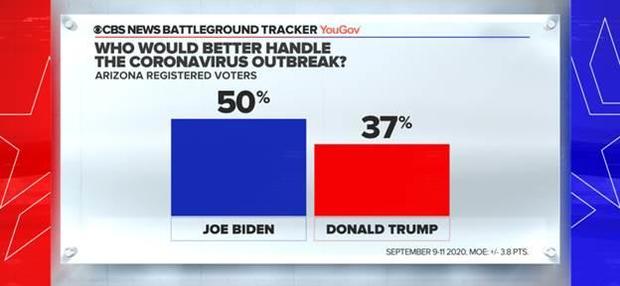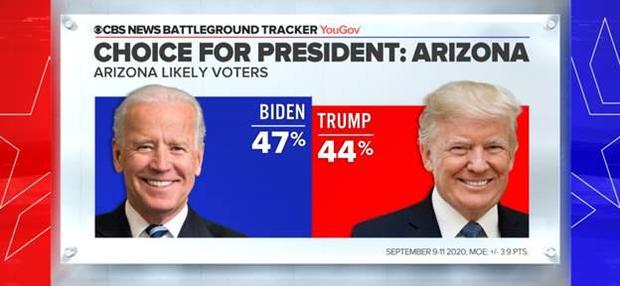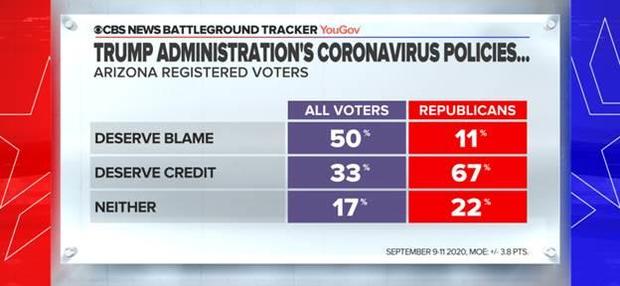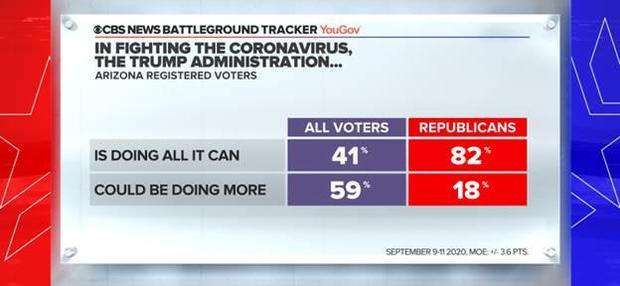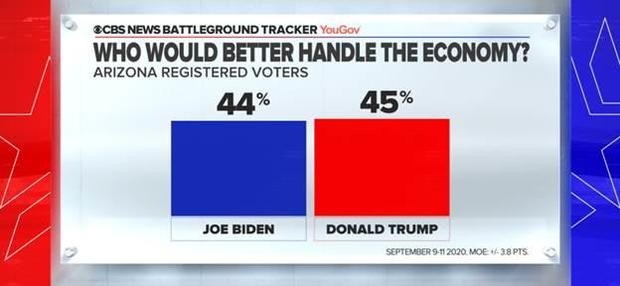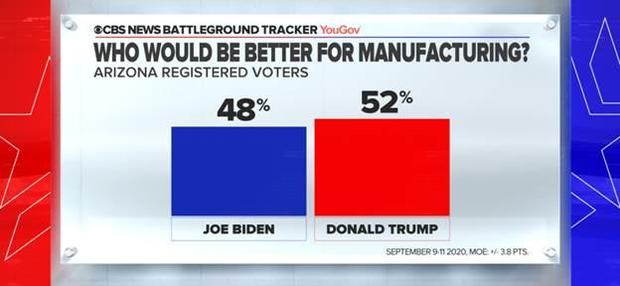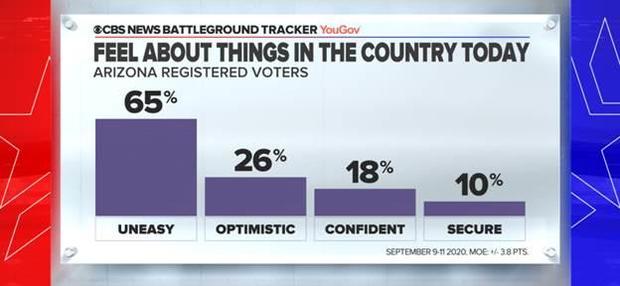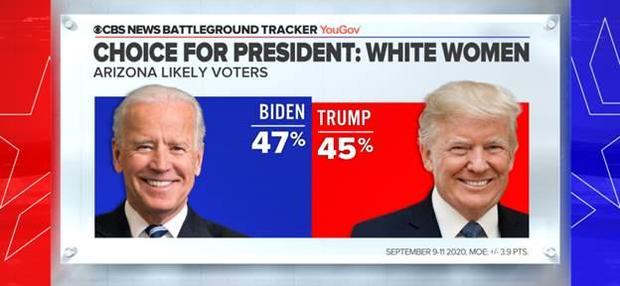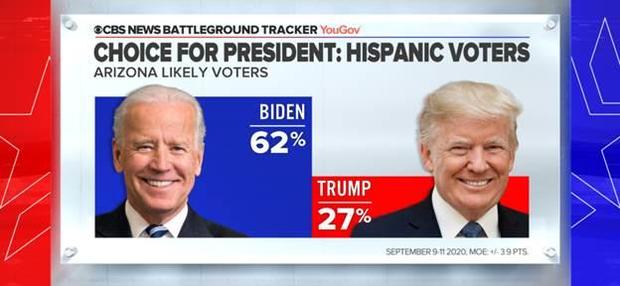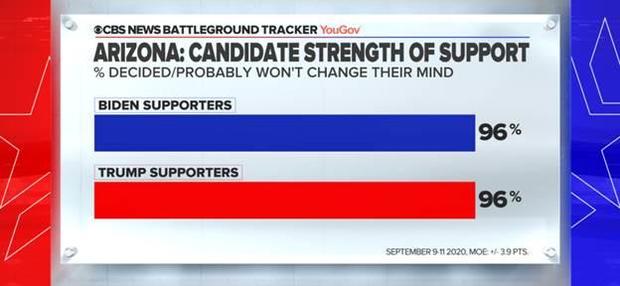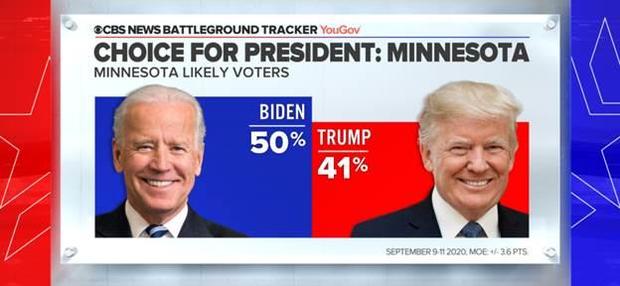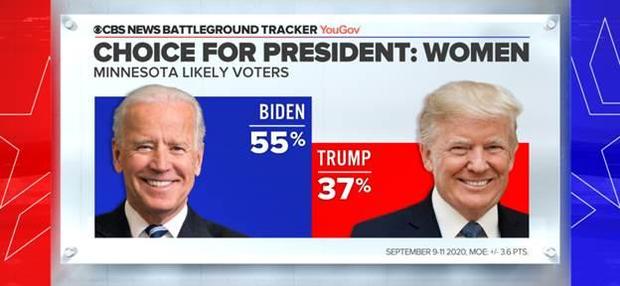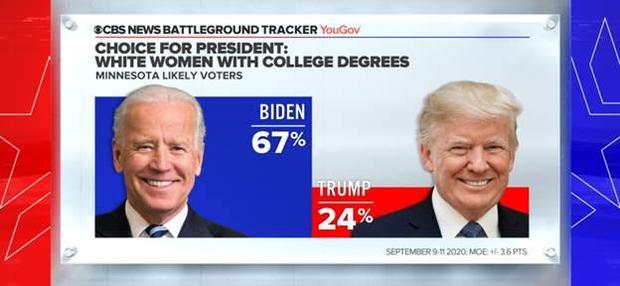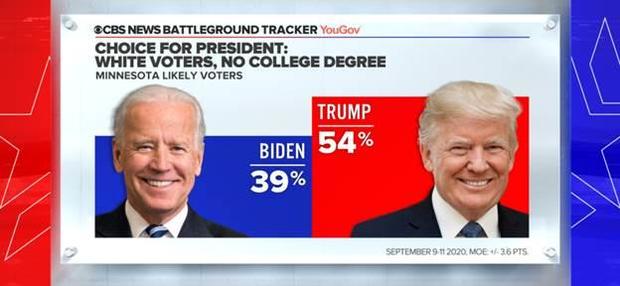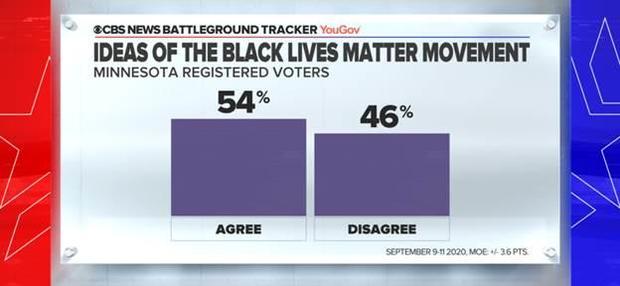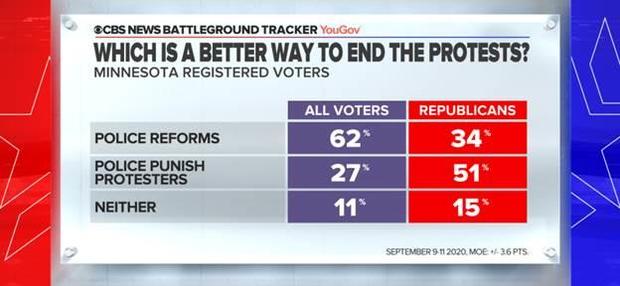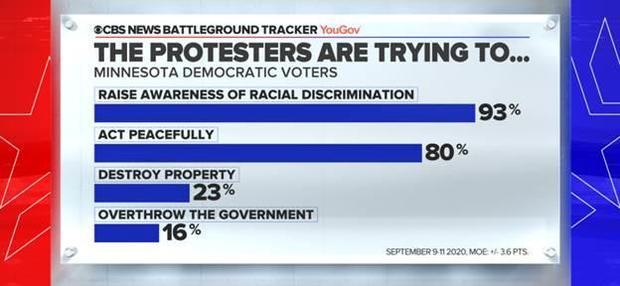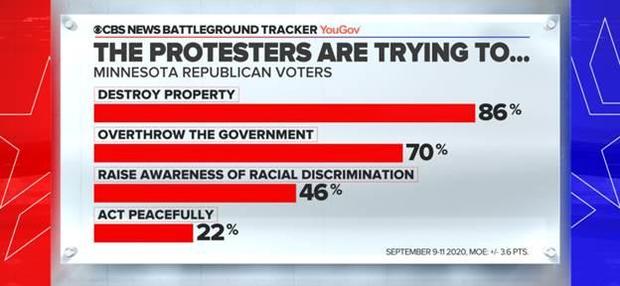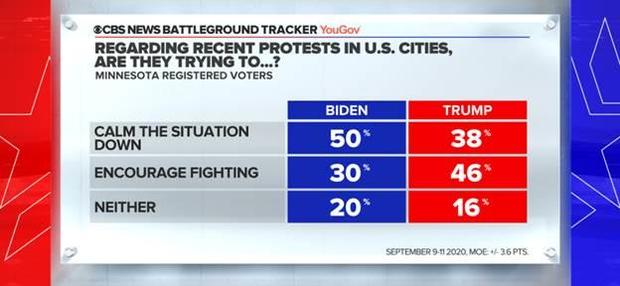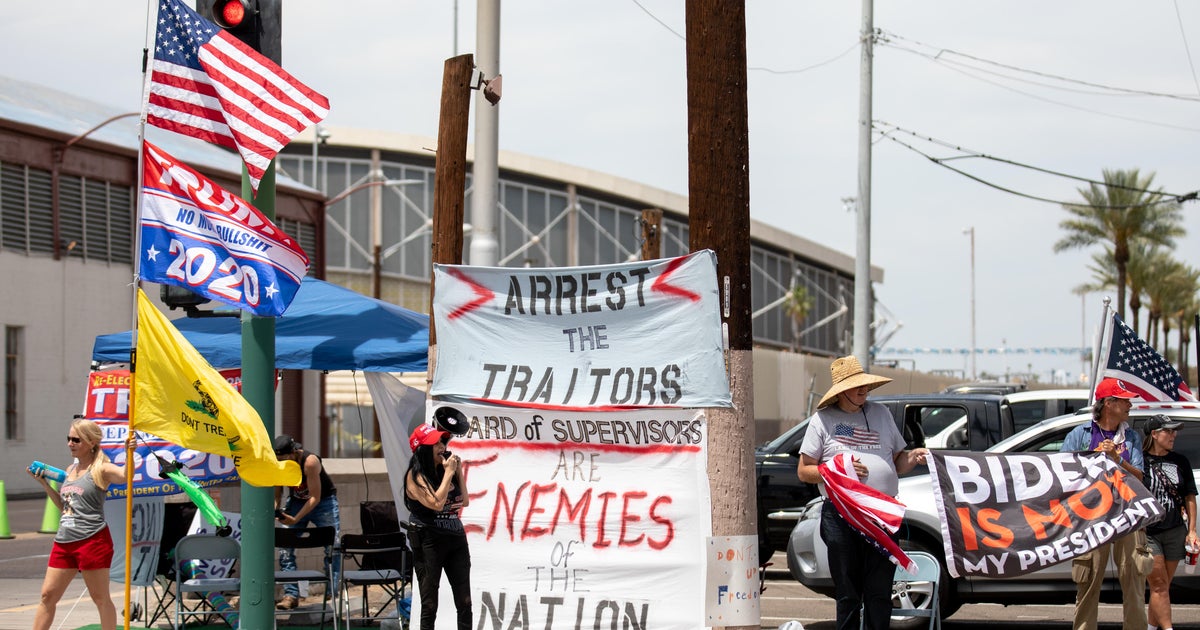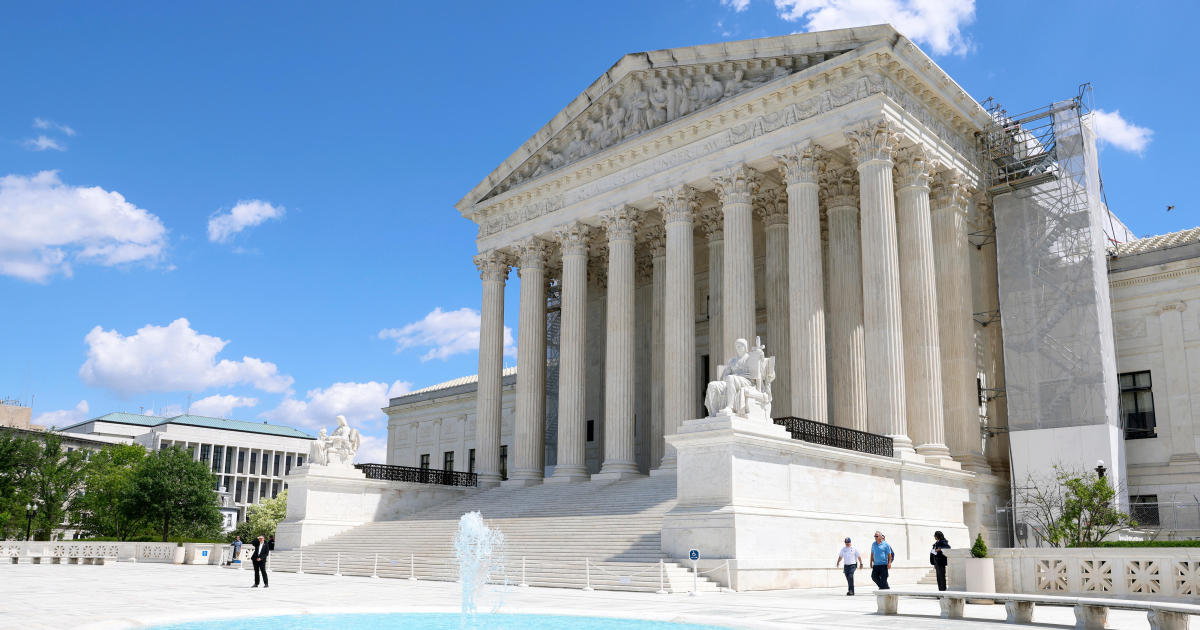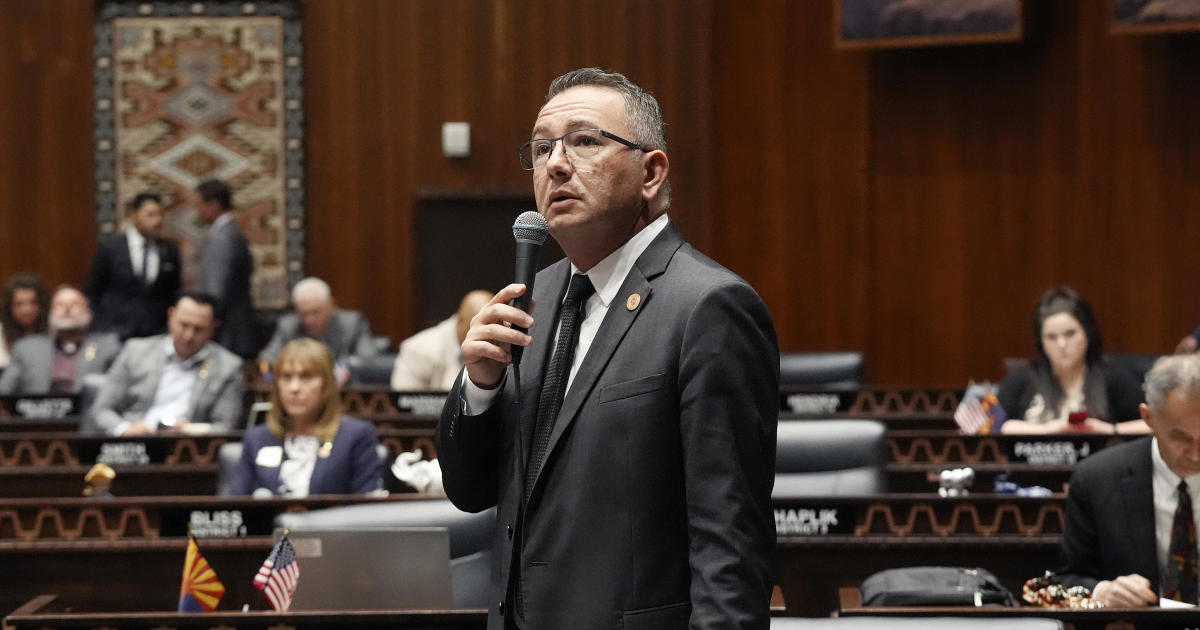Biden gains edge in Arizona over Trump and has big lead in Minnesota — Battleground Tracker poll
Every four years it can seem like the path to the presidency runs through the same list of well-trodden battleground states. But this time, we're on some newer turf: Democrats are contesting some states in the fast-growing Sun Belt — notably Arizona —which has been in the Republican column all but once since Eisenhower. And Republicans would love to leverage their White, working-class support in the Upper Midwest to flip Minnesota, which oh-so-narrowly eluded them four years ago to keep its string of Democratic votes unbroken since 1976.
Right now that potential trade looks tilted in favor of the Democrats. Let's start in Arizona, where Joe Biden has moved out to a small lead, ahead by three points, an edge that's increased from the tied race we found in July. It was then we first saw concern about COVID and the president's handling of it putting the state in play. Though that virus concern has come off its highs of the summer, it remains for a sizable two-thirds of voters, and is still closely tied to vote: the more concerned voters are, the less likely they are to be voting for President Trump.
And in a week that raised more questions about what the president knew about the virus early on, Arizonans feel that the nation's death toll could have been mitigated had plans been made sooner, and more pin blame on the administration for making the outbreak worse than give it credit for what it did do. Most voters think the administration could still be doing more right now to combat the virus. And so, on balance, Biden comes away with a 13-point lead on who would better handle the outbreak.
The economic fallout from the pandemic is certainly affecting things here too: more than half say they've felt at least some financial impact from it, and they're voting for Biden, 57%-32%.
But that said, the president is very much in this contest. Much of that starts with continuing, solid support from Republicans, who — as in other states — describe a very different state of affairs. For an overwhelming number of them, the president headed off an even-worse outbreak and is doing all he can against it today; his policies are helping the economy recover, and it can recover even if the virus isn't contained. It's not that Republicans were immune to the financial impact — four in 10 report at least some impact — but to them the president is still making the economy better now, and is better than Biden on handling the virus too.
Bolstered by that GOP base, the president is up overall among those who call the economy an important factor. He's narrowly up over Biden on handling the economy, generally, and manufacturing, specifically.
It's just that right now, in Arizona, it's not only about the economy. Feelings are dour about the nation's condition, more generally. A mere 18% of Arizona's voters feel confident about the country today (and three times more feel uneasy); 26% describe themselves as optimistic; 10% say they feel "secure," and all of that looks like headwinds for an incumbent, even one with relatively good economic marks against his opponent.
More White women have shifted toward Biden since July. He is now running neck-and-neck with Mr. Trump among them. And Biden enjoys a double-digit advantage over the president with White women with a college degree.
Sixty-two percent of Latinos are backing Biden, similar to the level of support Hillary Clinton got in 2016.
Among each candidate's supporters in Arizona, 96% say they're strong in their support. Given that, the coming weeks here do not look like a campaign about changing minds or swing voters. It looks more like a contest of two partisan factions with very different views of what's happened in America this year — a contest about motivation and turnout.
About 1,600 miles north in Minnesota, we find the Republicans with their work really cut out for them. Biden has a substantial nine-point lead, backed by improvement over Democrats' 2016 performance with college-degree holding voters, particularly college-educated White women. His current percentage is 13 points better than Hillary Clinton's was in 2016 and is closer to what Democrats got in the 2018 midterms.
For these women, 61% are voting for Biden mainly to oppose Mr. Trump, higher on that motivation than Biden's voters overall. Even those who think the state's economy is doing well are mostly voting for Biden. And 83% of them dislike how the president handles himself personally, higher than voters overall by double digits. With Biden doing better among women and White women than Democrats did in 2016, it becomes harder for the president to flip the state.
Still, for White, non-college voters who helped the president make the state so close last time, Mr. Trump offers some clear advantages. By more than two to one, they think he'd be better on energy exploration, and by large margins on manufacturing, agriculture, and farming — all important industries in Minnesota — as well on small business. These voters also believe Biden pays more attention to the concerns of Black voters than to those of White voters. But that may not be enough, as Mr. Trump's margin with the group is less pronounced than it was in 2016. He's at plus-15 with them now, versus plus-27 against Clinton.
Three months after the death of George Floyd sparked protests across the country, more than half of Minnesota voters — an electorate that is overwhelmingly White — say they agree with the ideas expressed by the Black Lives Matters movement. That's similar to how voters feel nationwide.
Majorities across the political spectrum say the recent protests in U.S. cities will be a major factor in their vote for president, but Republicans have different ideas about the best way to end them. While most Minnesota voters think there need to be police reforms that address racial discrimination, just over half of Republicans think the police and law enforcement should be used to punish the protesters.
Looking at one of the president's campaign messages on the potential spread of violent protests generally, it doesn't appear to be changing many votes. While nearly half (45%) of Minnesota's suburban voters do feel it is at least somewhat likely that "large, violent demonstrations, rioting and looting" may occur where they live, it's Republican suburbanites — already voting for the president — who are more likely than Democratic suburbanites to say this. And if it causes concern, it is not changing suburban views on how to deal with the protests: even among those who think such an occurrence is likely, a majority still thinks the way to stop them is through police reform, rather than the police cracking down on the protesters.
Partisans also view the goals of the protesters differently. Majorities of Democrats and Republicans agree that the protesters are trying change the way police treat minorities, but most Democrats and independents also think protesters are trying to raise the issue of racial discrimination and act peacefully. Most Republicans don't think the protesters intend to do either. Instead, nearly nine in 10 Republicans think most protestors are trying to destroy property, and seven in 10 Republicans say they believe most protesters are trying to overthrow the government.
Like most registered voters across the country, Minnesota voters tend to disapprove of the way Mr. Trump is handling the protests across U.S. cities, and they say he is encouraging fighting rather than trying to calm the situation. In contrast, voters see Biden as doing the opposite, and most approve his handling of the issue. Republicans see things differently: to them it is Mr. Trump who is trying to calm the situation and Biden who is encouraging fighting.
Finally, looking at the larger electoral map once again, if Democrats do hold Minnesota, it puts some extra pressure on Republicans to hang on to Arizona, since the two states have similar numbers of electoral votes.
These surveys were conducted on behalf of CBS News by YouGov between September 9-11 2020. They are based on representative samples of 1,122 registered voters in Arizona and 1,100 in Minnesota. Margins of error among registered voters are +/- 3.8 points in Arizona and +/- 3.6 points in Minnesota.
